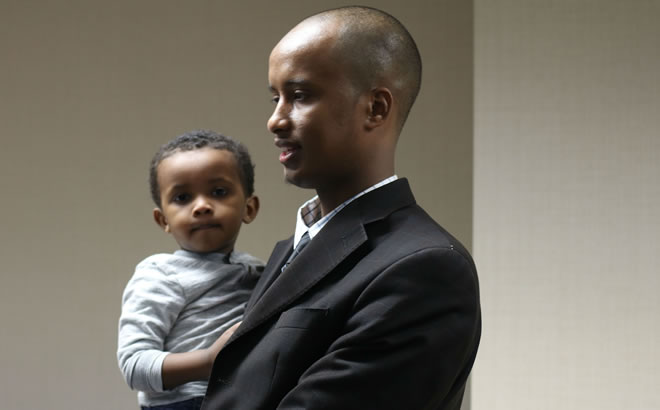Mahmud Kanyare has been driving school buses for Minneapolis and Suburban Bus Company for the past two years.

Mahmud Kanyare, leader of United Community of Drivers, says he was forced from work in January.

Susan Du
Monday, April 25, 2016
He says the buses he's assigned to drive are never heated properly, and that he's pressured to rush his routes regardless of traffic or the safety of students, who are always trying to climb over the seats or stick their heads out of windows.
But management refuses to compensate him for the extra time to make sure that all his kids get home in one piece, he claims.
"We are not transporting cattle," Kanyare says. "We are transporting children, beautiful children who are the future of this beautiful country."
So Kanyare lassoed about 15 other bus drivers who work for both Minneapolis and Suburban Bus Company and Monarch Bus Service into a bargaining group called the "United Community of Drivers." Their goal was to confront manager Dan Berg with their concerns.
Berg apparently thought their grievances were legitimate enough to sign his name to their petition, but said that any changes would fall to the actual owners of the bus companies.
On January 21, the United Community of Drivers showed up in the bus companies' shared headquarters, where the owners refused to meet with them. The drivers were told to leave or the cops would be called.
"Clearly that is a violation of the National Labor Relations Act, which allows groups of employees to talk to employers about their working conditions," says Ellen Longfellow, the group's attorney.
She has filed labor complaints with the National Labor Relations Board and discrimination complaints with the Equal Employment Opportunity Commission on behalf of the drivers.
Longfellow says the drivers also discovered, as they talked to each other, that Somali and immigrant drivers were usually getting assigned the most dilapidated buses in the lot, while the white and African American drivers got the best pickings.
Wages and hours were also deducted without warning, according to the complaints.
Mohamed Ali, who has driven for Monarch for nearly three years, says he would receive all sorts of promises at the beginning of the school year of being able to work 40 hours a week, and getting raises and fair compensation.
"But after three months, things change," he says.
The companies would calculate how much time they expected routes to take based on GPS configurations that don't take traffic into consideration. A route that would theoretically take two hours could become two and a half in reality when streets are closed off or students get sick. A half hour here and there would add up to significant cuts in their paychecks.
The drivers also were not paid for the time they spent driving back to headquarters at the end of their shifts, Longfellow says.
Monarch and Minneapolis and Suburban vigorously denied the drivers' version of events. Spokesman Matt Roznowski said the drivers left their jobs in January by their own choice, and the companies were disappointed to see them go.
"It is a fabrication for them to claim that they were 'locked out' of their jobs; that ownership was unwilling to listen to them; that they were threatened; or that the police were called after their meeting with management on January 21," Roznowski said in a statement. "The allegation about Somali drivers being given older buses to drive is false, and it is untrue that we tolerate operating buses without functioning heat during the winter."
The two companies employ more than 175 Somali drivers, who receive time and quiet praying spaces during workdays, in addition to complimentary, culturally appropriate food on religious holidays, Roznowski says.